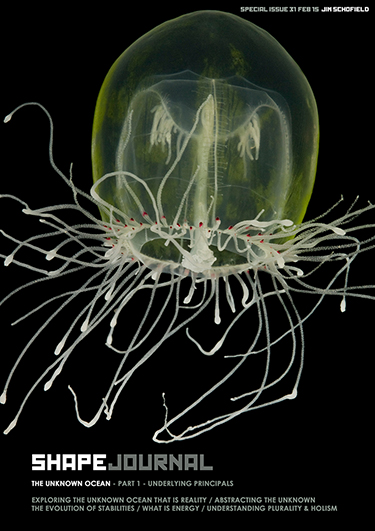
The Team
Jim Schofield - Editor
Physicist, Philosopher, Marxist, Multimedia Expert, Mathematician, Author, Sculptor.
Dr. Peter Mothersole - Editor
Senior Lecturer in Computing, Physicist, Photographer, Constructivist, Software Developer, Philosopher.
Mick Schofield - Art Director
Graphic Designer, Writer, Photographer, Music Producer,
Digital Artist, Webmaster |
|
|
|
SHAPE Special Issue 31
The Unknown Ocean I
Underlying Principals
1. Introduction:
The Unknown Ocean that is Reality
2. Abstracting the Unknown:
A Constructivist Alternative
3. The Evolution of Stabilities
4. What is Energy?
5. The Bases for Understanding:
Plurality and Holism
6. Conclusion
Read PDF (Right click link to Download)
Comment on this Issue
Editorial
Welcome to the 31st Special Issue of the SHAPE Journal, and the first in a three part series entitled The Unknown Ocean - a body of work examining how little we actually know about Reality, and how we will have to change our methods of exploration entirely, if we are to go any deeper.
In pulling together this set of Special Issues of the SHAPE Journal, the writer has a particular objective in mind. He is not looking back at the past achievements of Science and Philosophy, but looking forward to the still-pending investigations into Reality, from a very different standpoint, which he is certain, will transform both of these disciplines. The reason for this is that a major threshold lies before Mankind, which so far they have refused to address, and hence never transcended, and, instead, continue with the old views and methods, which, in themselves, are incapable of transcending that evident impasse.
In all the main intellectual disciplines the old hang-ups are still well entrenched, underpinning both Modern Science and Philosophy. These crucial areas are weighed down with the abstractions, constructions, assumptions and even principles of a now significantly failing past intellectual stance. For these are no longer worthy of delivering a productive and developing standpoint, essential at this time to produce any real progress at all. Science has run out of steam. Since 1927 Physics has only moved backwards towards an even more defunct idealist standpoint.
Yet, the way forward has been, at least, indicated, for the last 2,500 years with both the Holism of the Buddha in India, and the scepticism of Zeno of Elea.In spite of a long period of stagnation, philosophically, finally, only 200 years ago, Frederick Hegel, in his main philosophical undertaking, revealed the inadequacies of our concepts, and why they were inevitably so. But, of course, Hegel was an idealist (an obvious disadvantage in his own primary objective of unifying Philosophy with Science) so that, not even his leading disciples, namely Karl Marx and Frederick Engels, saw that Hegel’s gains in the area of Human thinking just had to be re-established within the alternative, materialist philosophical outlook, and, of course, intimately wedded to Science. But, that just hasn’t happened!
Despite brilliant contributions by scientists like Darwin and Wallace, and the major gains in Philosophy made by Marx, the necessary re-construction of a consequent philosophy among scientists did not occur. And, that has been a major problem. Now, the situation is beginning to change, as this writer, and many others worldwide, begin to question the impasses and anomalies proliferating in all areas of Modern Science, and are endeavouring to construct a new, and sounder basis, and this series of Specials deliver some suggested steps in an advancing a wholly new understanding upon a, so far, unimplemented standpoint in Science and in Philosophy together. It is, of course, a presumptive claim, so he has broken the argument down into three parts, commencing here in the first of these, with a series of essays which establish his premises, before entering those unchartered depths.
Jim Schofield
FEB 2015
|
|
|




